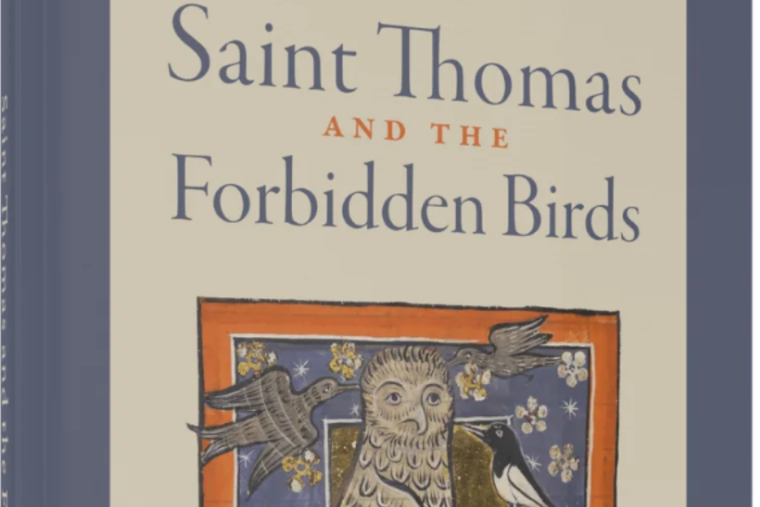Here’s the Latest Proof of the ‘Exciting Rebirth’ of Catholic Poetry in the US
This collection of poems by James Matthew Wilson offers an appreciation for the gift of life in all its sorrows, wonders, mysteries and simple pleasures.

Saint Thomas and the Forbidden Birds
By James Matthew Wilson
Word on Fire Publishing, 2024
128 pages, $24.95
To order: WordonFire.org
There has been some buzz of late among the Catholic-letters crowd concerning a renewed interest in Catholic-themed art, whether fiction, music or, especially, poetry.
Adding to this contemporary buzz is the April 29 release of Saint Thomas and the Forbidden Birds, a book of 49 new poems by James Matthew Wilson, a poet, essayist and “cultural critic” who co-founded the creative writing program at the University of St. Thomas in Houston.
A poet whose art is deeply connected to his Catholic faith, Wilson’s new book offers works on topics ranging from redemptive grace to the simple wonders of life in a fecund nature.
While not all of the poems in this work deal strictly with Catholic themes, they each suggest an appreciation for the gift of life in all its sorrows, wonders, mysteries and simple pleasures.
The title poem, Saint Thomas and the Forbidden Birds, for example, offers the reader a glimpse of St. Thomas Aquinas preparing a commentary on the Old Testament proscription against various fowl. With its AA-BB rhyme scheme and its fluid structure, the writer has St. Thomas equating the biblical forbidden birds with the temptations and lures in a fallen world. To wit:
And who, on seeing the gull, does not admire
That its bright wings to heaven may aspire?
And yet, it wastes its hours adrift at sea
Gorging on fishy sensuality.
Wilson is a poet who can fabricate a poem out of the most prosaic circumstances, leaving the house in early-morning darkness, helping a young boy devise a plot for his first book. Or take the poem Register, where a grocery-store check-out line becomes a tableau of the human tendency to form judgments about strangers based simply on appearances.
And there’s the more sombre In the Holding Cell, a sonnet-length word picture of a “brain still clouded” young man struggling to recall what it was that brought him to his foreboding place.
Some of the poems in Forbidden Birds are laments for the loss of faith and the waning enthusiasm for the sacraments as younger Catholics venture into adult life. The poem Return to Saint Thomas is instructive. Saint Thomas in this case is not Aquinas, but the name of Wilson’s boyhood parish church in Grand Rapids, Michigan. Wilson’s recent visit to the parish, accompanied “with five children we’ve amassed,” inspired the following lament-laden lines:
As I turn toward strange faces offering peace,
And fail to find those who were borne with me
Through all the sacraments, those taught to see,
In every fall, a chance to be redeemed,
Never suspecting prayer might simply cease.
The same poem however, includes a hopeful element, indicative no doubt of Wilson’s confidence in an enduring, sustaining faith:
A few gray heads, behind, recall a past
When that bright-sharded window cast a gloss
On pews packed full: however time’s waves toss
The Church, it bears its people to the last.
There’s a bit of playfulness within the widely diverse poetic topics in this book. Wilson labors to make poetry more accessible to the reading public. He eschews deliberately obscure or ambiguous verse in favor of clarity of message. At the same time, Wilson is a strong supporter of rhyme and meter, the pleasing arrangement of wording in rhythmic verse.
The short poem In the Fullness of Rhyme pokes fun at those fellow poets who, in Wilson’s view, take liberties with rhyming to the detriment of the finished product. The wise poet, Wilson holds, “must know enough of rhyme to tell the caviar from the slime.”
While one can’t write by guide or chart,
The artist gives the law to art …
And every line will weigh with those
Sweet rhymes that our first poets chose.
No less a personage as Dana Gioia, onetime poet laureate of California and chairman of the National Endowment for the Arts, sees Saint Thomas and the Forbidden Birds as yet another indication of the “exciting rebirth” of Catholic poetry in the United States.
Readers unfamiliar with Wilson’s past work might stumble over certain proper names and specific locations found in a few of the titles, but, overall, Saint Thomas and the Forbidden Birds can be viewed as one more of Wilson’s efforts to bring well-crafted, meaningful poetry to wider audiences over-sated with the bland offerings of pop art and low culture.
Mike Mastromatteo is a writer, editor and book reviewer from Toronto.
- Keywords:
- catholic writers
- poetry















